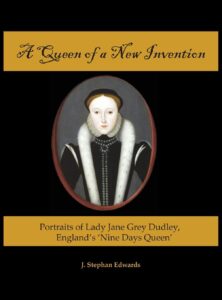 There are twenty-nine surviving portraits which have, at one time or another, been said to depict the ill-fated “Nine Days Queen” Lady Jane Grey, but the authenticity of many of them is, at best, dubious. In his book A Queen of a New Invention: Portraits of Lady Jane Grey Dudley, England’s Nine Days Queen, Lady Jane Grey expert J. Stephan Edwards, examines the provenance of each portrait in an attempt to find the ‘real’ Lady Jane Grey.
There are twenty-nine surviving portraits which have, at one time or another, been said to depict the ill-fated “Nine Days Queen” Lady Jane Grey, but the authenticity of many of them is, at best, dubious. In his book A Queen of a New Invention: Portraits of Lady Jane Grey Dudley, England’s Nine Days Queen, Lady Jane Grey expert J. Stephan Edwards, examines the provenance of each portrait in an attempt to find the ‘real’ Lady Jane Grey.
I’d first like to mention what a beautiful book A Queen of a New Invention: Portraits of Lady Jane Grey Dudley, England’s Nine Days Queen is. It’s hardback, is full-colour and has that matte, cloth-like feel that you just want to stroke. Many of the portraits are given a full page so the reader can appreciate the beauty of them, even if they’re not of Lady Jane Grey, and there are various other smaller images, like miniatures. It is the perfect ‘coffee table’ book, it’s gorgeous, and guests to your home won’t be able to help themselves flicking through it.
But, it doesn’t just look good, the information in it is first rate, well-written and presented in a readable way. Each portrait has its own section with its name, the artist (if known), the date and provenance. Edwards then goes on to explain how the image links to Lady Jane Grey and then examines evidence, such as the jewellery the sitter is wearing compared to historical inventories, to come to a conclusion regarding whether the portrait really is Jane.
In the introduction, Edwards also considers Jane’s story and her afterlife, i.e. the popular mythology that has grown up around her.
A Queen of a New Invention: Portraits of Lady Jane Grey Dudley, England’s Nine Days Queen is obviously the result of many years of research, and meticulous research at that, and is a fascinating read. Although two portraits of Jane were documented as existing in the 16th century, and were owned by Bess of Hardwick and John Lumley, these portraits have disappeared and we’re left with twenty-nine surviving paintings which don’t appear to be Jane. It is frustrating and heart-breaking that Jane’s image is lost to history, although I was glad to read that one image, the Syon Portrait, “may well be the closest we shall ever come to an authentic likeness of the Nine Days Queen.”
The book is fully-referenced, with chapter endnotes and a bibliography. In the appendices, Edwards has included the Spinola Letter, which historians have, in the past, relied on as a physical description of Jane, and then a section on the lost portraits and Edwards’ search for them. Whether you’re an art history buff or a Tudor history buff, you’ll find this book a fascinating and very worthwhile read. Wonderful.
Blurb:
Lady Jane Grey Dudley was proclaimed Queen of England on 10 July 1553 following the untimely death of Henry VIII’s only son and successor, King Edward VI. But sixteen-year- old Jane did not have the support of the majority of her would-be subjects. They rallied instead to Henry VIII’s eldest daughter, Mary Tudor. Jane was deposed just nine days after her reign began, earning for her the sobriquet ‘The Nine Days Queen.’ She was imprisoned in the Tower for six months before finally being executed on 12 February 1554. Queen Jane remains the only English monarch of the past five centuries for whom no genuine portrait is known to have survived. Dozens of images have been put forward over those five centuries, but none has yet been conclusively authenticated. Neither has any comprehensive academic study of the iconography of Jane Grey Dudley ever been previously undertaken or published. Now, through almost a decade of research leading up to this volume, twenty-nine surviving portrait-images said to depict Jane have been carefully and systematically sought out, analyzed, and contextualized in an effort to determine whether any of them may be a reliable likeness. A handful of additional paintings all now lost are also discussed in detail. Finally, the single written account of Jane’s physical appearance, an account upon which historians have relied over the past century, is analyzed for its own authenticity.
Hardcover: 224 pages (also available as a paperback)
Publisher: Old John Publishing (February 12, 2015)
Language: English
ISBN-10: 0986387304
ISBN-13: 978-0986387302
Available from Amazon.com, Amazon UK or your usual bookstore.
Originally posted on June 3, 2015.